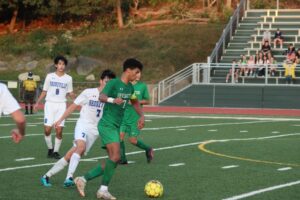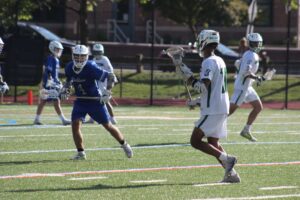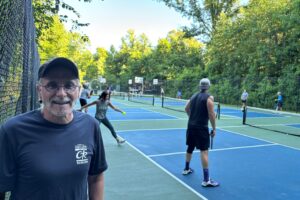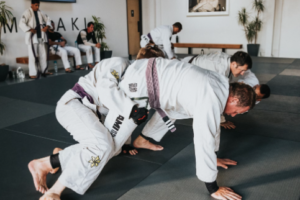
Isaiah Boyles is a senior at Irvington High School, currently serving as captain of the boys’ varsity soccer team and continuing his athletic pursuits in the spring playing lacrosse. An accomplished athlete, Isaiah received All-League and All-Section awards in 2019 and 2020 for soccer, and All-League for lacrosse in the spring of 2021. He was also named a Rivertown’s All-Star for the 2020 soccer season.
But Boyles’ high school accomplishments are not confined to the field. In addition to his impressive athletic career, he is a dedicated student and active member of his community. For four years, Boyles has served on the Irvington community advisory board, striving to protect young people from the dangers of substance abuse.
Advocating against substance abuse and raising awareness about the multitude of mental health issues associated with it is an issue Boyles is passionate about. In addition to his status with the community advisory board, he frequently works with the Westchester Youth Task Force, and is the co-leader of the Positive Impact club at his school.
The Positive Impact club, like the task force, aims to raise awareness about substance abuse, setting up stands and organizing events to spread the word about this important issue.

All of the activities Boyles participates in outside of school play a role in the leader he is today. According to Boyles, one of the most important skills he’s gained from his community service experience is that of effective communication.
“Once I learned how to become a better public speaker, I found more enjoyment in working with other people, even if I didn’t know them, because it kind of came more naturally,” he said. “Whether it’s with soccer or any other leadership roles, kind of just putting others’ best interests at heart and making sure everyone’s on the same page is really important.”
Boyles and his family will receive a three-month all-inclusive family membership to the Shames JCC, which includes access to the Aquatics Center, group exercise classes, and Fitness Center.
As a senior going through college application season and recovering from the infamous remote year of school, Boyles admits that juggling athletics, community service, and school can be a challenge. Of this, Boyles emphasizes the importance of time management and setting goals for himself.
“Last year specifically, during the lacrosse season, we had pretty long practices, about two-hour practices, and then AP tests came in,” he said. “And then this year, during soccer, there’s college applications that I have to do. I’d say the biggest challenge is managing my time, keeping my priorities straight in terms of academics and attending practice every day.”
In spite of this, Boyles has “gotten into a groove” with sports and school, looking to the performance of student-athletes he admires for motivation. But on the field, more than anything, he values teamwork, as he finds that a strong team dynamic makes a world of difference.
“I think that any and all of the success I’ve had in recent years is credit to my team and the team culture that we’ve had,” Boyles said.
Q & A With Isaiah Boyles
Are you involved in any extracurriculars aside from soccer and lacrosse?
I work with the Irvington community advisory board and I am currently a co-leader of the Positive Impact club as well. I do some work with the Westchester Youth Task Force as well. So essentially, the Westchester Youth Task Force is a group of representatives from different schools across Westchester and we meet and discuss different problems with substance abuse and ill choices with teens across Westchester, and then, there’s events that are planned where representatives from different schools propose events to plan either across the county as a whole or for their school and neighboring schools particularly. The Positive Impact Club also surrounds substance abuse and mental health illnesses, and just kind of raise awareness for those problems. We set up events around the school, whether it’s stands, or just activities where people can stop by on their free period and join in on. Just kind of raise awareness and just kind of encourage others to do the same.”
How do you tackle the responsibility of the various leadership positions that you hold?
“From an early age, I was invited to the community advisory board, which is another leadership group that I’m currently involved in, and at first it was a little bit weird for me because I wasn’t the most outgoing person. But upon becoming a better public speaker I got myself involved in these different conferences and committees and these different leadership groups and advisory groups, I kind of found my groove that way. Once I learned how to become a better public speaker, I found more enjoyment in working with other people, even if I didn’t know them, because it kind of came more naturally. Whether it’s with soccer or any other leadership roles, kind of just putting others’ best interests at heart and making sure everyone’s on the same page is really important.”
What do you find most challenging about your role as a student athlete?
I’d say mostly time management. IN my underclassmen years of highschool it was a little easier. Last year specifically, during the lacrosse season, we had pretty long practices, about two hour practices, and then AP tests came in. And then this year, during soccer, there’s college applications that I have to do. I’d say the biggest challenge is managing my time, keeping my priorities straight in terms of academics and attending practice every day. But after, I mean I’ve been doing it for three years so far, so I’ve kind of gotten into a groove. But it’s really just having discipline with your work and managing your time in a way that suits your schedule.”
How do you balance community involvement, as well as academic achievement, with the commitment of athletics?
“I’d say it’s pretty simple, the scheduling aspect of it. I try to come home from soccer and immediately transition into my schoolwork, and it’s really, I guess it’s not so much of the time management, once you get your regular schedule down. It’s more so just using your time as productively as possible. I’ve come to realize that the more productive you are in the present, the less stressful it will be in the future. I really just try to be as productive as possible after practices with the limited time I have, so I don’t let stuff catch up to me in the long run.”
What motivates you most on the field?
“I’d say that as an athlete, I’d say other athletes motivate me the most because one thing I find myself doing is comparing myself to other players a good amount, so past players I’ve seen, not only on my own team, but past players that I’ve played against. I find myself comparing myself to them and it’s good in a way that I can keep myself on the right track and I have goals to aim for. I try to keep a high standard by comparing myself to other athletes that have been successful and using their path as my own path.”
What is the most rewarding part of achieving feats for your team?
“I’d really say the most rewarding part, it sounds a little bit cheesy, I think winning with people you’ve grown up your whole entire life. Especially the soccer aspect I’m playing with friends I’ve played with since first grade, second grade, and just being able to play with them, win with them, have a great time winning with them, is really the best part of it all. I think as I’ve gone through highschool, the teams that I’ve been on have gotten better throughout the years, and seeing that improvement after working with them through the off-season, putting in the time to really execute on the field, is definitely the most rewarding part of it.
Can you speak to having a strong team dynamic—Do you think that your teams have that, and do you think that that affects your performance?
“Definitely. I know just speaking from the last lacrosse season and this soccer season, we did team bonding often—not even planned team bonding, it was really spontaneous. We hung out together outside of practice, outside of games. It really helps you trust your teammates and it gives you an edge to want to win for your teammates. When things go wrong on the field and you’re playing with people that you really enjoy playing with and you respect, it’s a lot easier to bounce back, rather than get down on each other.”
Would you be able to credit some of your own success to your teammates?
“I think, without a doubt, I’ve experienced seasons where the team chemistry grew apart a little bit, and that’s when things started to grow wrong. I think that any and all of the success I’ve had in recent years is credit to my team and the team culture that we’ve had.”
Is there someone who has inspired you, or helped you meet your achievements?
“I don’t think there’d be one person in particular. I think it’s kind of just anyone on the team, I don’t even really think about my own accomplishments, but when you play with people who are really talented themselves and who really want you to succeed, it’s ten times easier to accomplish anything within your range.”
How do you involve yourself in your community?
“I think being on sports teams, and especially holding a leadership role on sports teams, helps a lot in many respects. In lacrosse, we help with younger kids, we play lacrosse and we help coach them. In soccer, we’ve tried to plan activities with the Outhouse in Irvington. Really just playing sports gives you a central position in the community in some ways. With school as well, I’ve been asked to join a lot of groups that intertwine my leadership capabilities with the town, and once you start meeting people with those activities, it starts piling up. I first joined the community advisory board, and then I was asked to join other groups. They all kind of string together. It’s mostly just using your leadership role to represent the student voice and the voice of kids in your community.”
What lessons have you learned from your role as a student athlete?
“I’ve learned a lot about the teamwork aspect of it and how important it is to have a good dynamic on a team. That goes for sports or not for sports, whatever you’re involved with, you know, making sure that everyone is on board and that everyone is involved and that you include everyone in the work, because that’s the way to success. And, you know, it all goes by really quickly, and you shouldn’t take any of it for granted. Especially speaking for soccer seasons and lacrosse and even school, it goes by quickly and there’s a lot of opportunities to do great things, in both the academic sense and the athletic sense in highschool. You have to make the most out of your time. No one’s going to wait for you. Everyone’s capable of doing great things and it’s really just a matter of whether you do it. I’ve learned that the mental discipline aspect of it is really important, in order to perform in sports in your season, you have to put in a lot of work in the off-season. It’s hard to tell if that’s going to pay off in your season, because you’re not receiving any accolades or anything, but it does translate directly into the season. The mental discipline both in the classroom and on the field is one of the most important lessons I’ve learned.”
If you could describe your experience as a student-athlete in three words, what would they be?
“I would say exciting, difficult, and memorable.”
What do you think the future holds for you?
“I know what I would like it to look like. I want to go to a college that suits me. I’m not going to play soccer or lacrosse at any specific college, but I would like to continue to play club and continue the competitive part of the sport in that way. Really, I just want to be in an environment that suits me, that allows me to be my best self athletically and especially academically, and really just enjoying my time learning something I love.”
Alexa Murphy is a sophomore at the Masters School who is interested in political science and the language arts.







